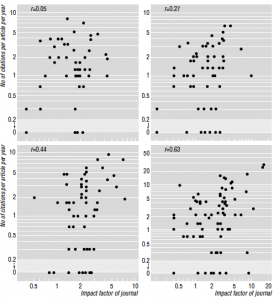Where to send computational and theoretical neuroscience papers? A list of journals can be found on Jim Perlewitz’s page. First, many journals belong to one of the scientific publishing companies who make huge profits from the free work of academics (margins around 30-40%), with questionable added value. In computational neuroscience, we have:
-
Journal in Computational Neuroscience (Springer Nature)
-
Frontiers in Computational Neuroscience; in Neuroinformatics (Springer Nature)
-
Biological Cybernetics (Springer Nature)
-
The Journal of Mathematical Neuroscience (Springer Nature)
-
Cognitive Neurodynamics (Springer Nature)
-
Neuroinformatics (Springer Nature)
-
Network: Computation in Neural Systems (Taylor & Francis)
Then we have Neural Computation, run by MIT Press, which is non-profit. Unfortunately, papers are behind paywalls. In my case, the library does not have a subscription.
Finally, there is PLoS Computational Biology, a highly respected journal in the field. However, even in this non-profit journal, open access is very expensive ($2250 per paper). I find these costs hard to justify, when any scientist can publish on archives for free (eg arxiv or biorxiv). The solution to this is overlay journals: the papers are linked to an archive site; the journal only deals with peer-review.
I was also recently rather disappointed by PLoS CB, after a paper got rejected 10 month after submission on the sole basis of interest. Based on the reactions I received, this is not an isolated case. Anyway, PLoS CB practices editorial pre-selection, which is highly subjective. As for other prestigious journals, its prestige is precisely based on its relatively low acceptance rate. But this is a highly questionable model, because it is wasteful: wasting the time of authors who submit the same paper to many journals, wasting the time of reviewers who write reports that are thrown away. In my opinion, it is also perverse. It gives a label of quality to individual papers and scientists based on the opinion of just a couple of scientists, sampled by one editor, and this insignificant label is then used by various committees (grants, promotions, hiring). It also pushes authors into boosting their claims to pass the editorial barrier. The solution to this is post-publication review (see also Michael Eisen’s post).
So ideally, I would like to see an overlay journal practicing post-publication review in my field. The question now is: should we create one? What would be needed is the technical infrastructure, but I am not sure it is fully available yet (as regards the post-publication review system, indexing etc).
Alternatively, we could use a general post-publication review journal. There is for example F1000 Research. PeerJ also does this partially (publishing the reviews is an option). Both cost about $1000 per article; both are run by companies. But they are less expensive than alternative open access journals (PLoS ONE: $1495; eNeuro: $1950 for members, $2925 otherwise), and more open. None of these two journals is ideal, but they represent some progress over conventional journals.
There are two issues with choosing a general journal. First, there is the question of editors. I have no experience with these journals so I am not sure there is the relevant expertise in the editorial board. I have seen a couple of computational neuroscientists in PeerJ though. The second issue is visibility. One idea could be to manage a list of computational neuroscience papers, to which anyone could submit a reference or preprint, in addition to automatic additions (say from relevant journals + keyword alerts). One would simply subscribe to the list (RSS feed or email alert).
Any good ideas are welcome!
Update (6.1.2017)
Some more information and thought following comments on this text:
- One issue for an overlay journal is to get it indexed in Pubmed. This seems quite important for a neuroscience journal, but the indexing requirements seem to be pretty much contradictory with the idea of an overlay journal, as it requires XML-tagged data of its bibliographic citations. But maybe this could be negotiable? (see "Optional arrangement"). Some more general information about indexing here.
- Other issue is more technical; to get an automatic post-publication review system.
- Finally a general thought; there is no reason why this should be specific to computational neuroscience. However, this could be a first step towards a more generalized system.

